Have you ever considered honoring your tools? Whether it’s your laptop, kitchen knife, or trusty car, the Significance of Ayudha Puja During Dasara is all about that! This unique ritual is celebrated during Dasara and shows gratitude to the objects supporting our work and life. Are you curious why this tradition matters and how it’s still relevant today? Let’s explore the fascinating world of Ayudha Puja together!
Why does Ayudha Puja feel so special?
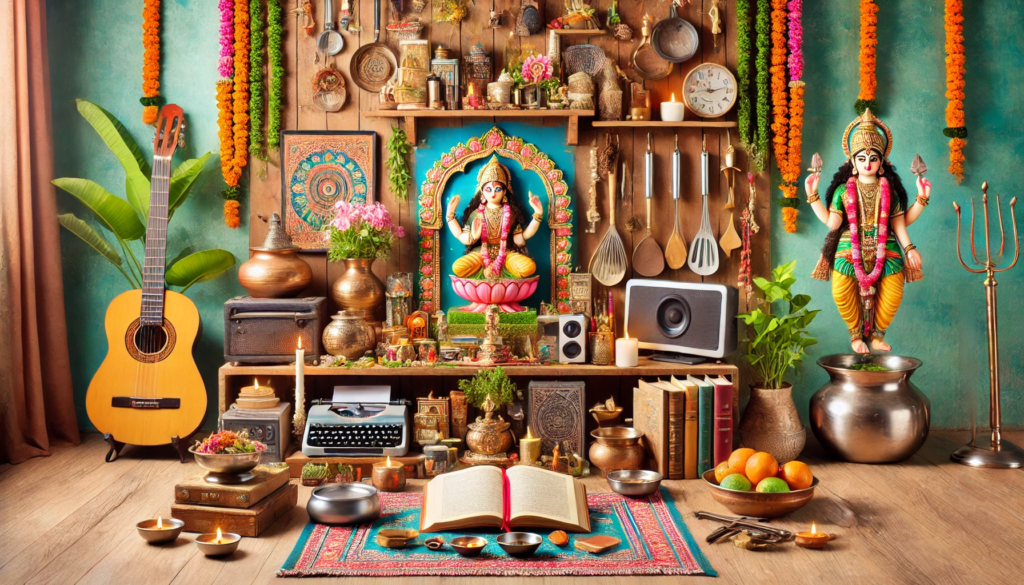
It’s more than just rituals and reverence. Celebrated during Dasara, Ayudha Puja is a day where we honor tools and instruments and the spirit of gratitude that flows through our lives. Imagine all the gadgets, utensils, and smartphones taking a slightly exaggerated bow. Perhaps. But this celebration is about recognizing the significance of every item we use to improve our lives. Let’s dive into the history, meaning, and why it should matter to you.
What is Ayudha Puja? The Essence Behind the Celebration
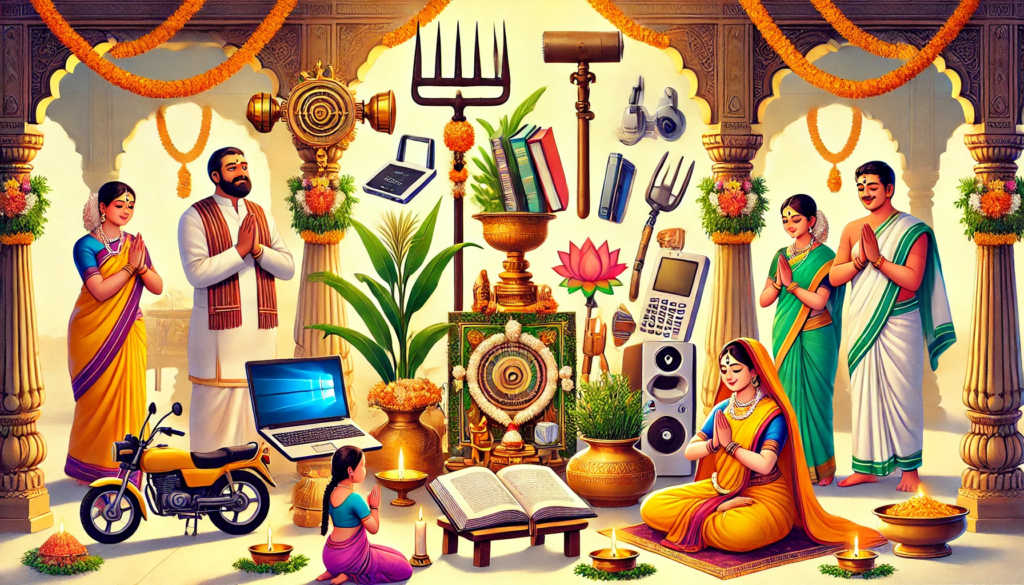
Ayudha Puja is one of the critical rituals during the ten-day grand festival of Dasara in India. Traditionally, the word “Ayudha” means “tools or instruments. ” This Puja is about paying homage to these items, anything that helps you earn a living or improve your life. Farmers celebrate their plows, students their books, and workers their tools.
But why honor objects? In essence, Ayudha Puja teaches us gratitude. It’s about acknowledging the often-overlooked elements of our lives, those small things that enable our daily actions. It’s a metaphor for respecting all that silently supports our journey.
The Mythological Backdrop
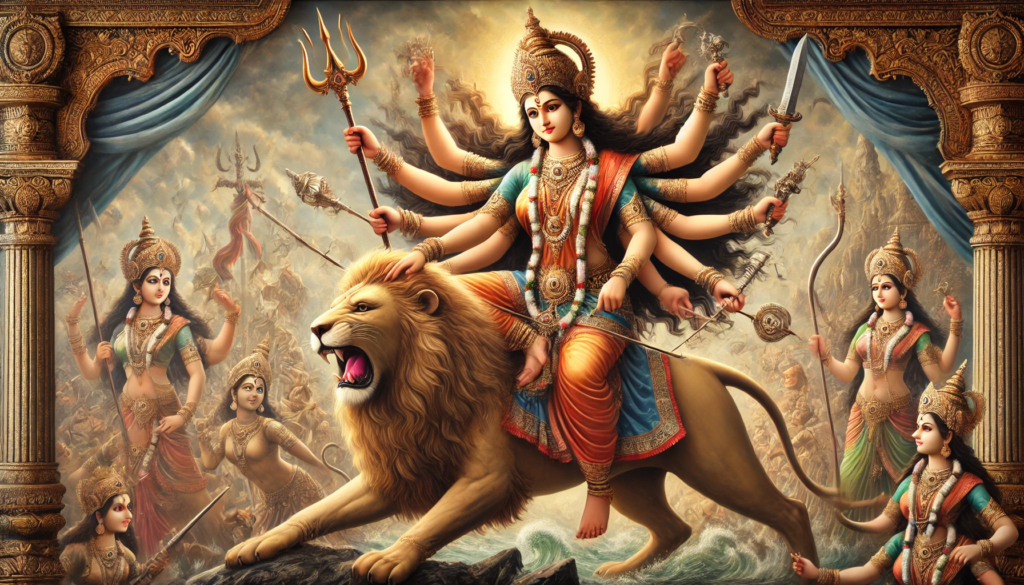
Ayudha Puja is tied to Hindu mythology. Legend has it that this day marks when Arjuna, one of the Pandavas, retrieved his weapons after their period of exile and worshipped them before the great war in the Mahabharata. Goddess Durga is also worshipped as the destroyer of evil, symbolizing empowerment. This reverence for weapons and tools of war expanded to honor all tools that help us overcome literal and metaphorical challenges.
“Without tools, there can be no building of anything, whether it’s a home or a life.” The beauty of Ayudha Puja is that it symbolizes empowerment, the kind of strength that comes not from might but skill, effort, and dedication.
The Cultural Significance of Ayudha Puja in Dasara

Imagine a carpenter without his hammer or a writer without her pen (or laptop, more likely). Tools are extensions of who we are, and Ayudha Puja acknowledges this relationship. By celebrating tools, we celebrate work itself, irrespective of the kind.
- Acknowledging the Divine in the Mundane: In Indian culture, the divine exists in temples and the mundane. When a child touches their book to their forehead in reverence, it’s Ayudha Puja in action. It’s about seeing the divine in daily tasks.
- Community Unity: This Puja brings communities together as people clean, decorate, and worship their tools. It’s a collective reminder of the value of honest labor and mutual respect’s work.
If you think about it, Ayudha Puja is the ultimate “bring your tools to the spotlight” day. From auto-rickshaw drivers decorating their vehicles with flowers to homemakers cleaning kitchen appliances, it’s a day of unity through gratitude.
Ayudha Puja and the Spirit of Skillfulness
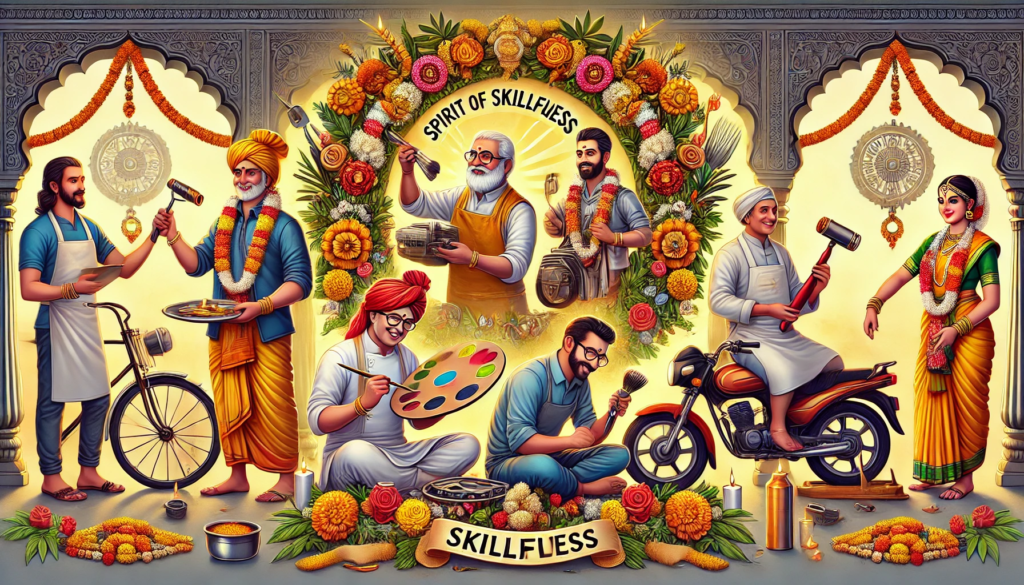
One of the critical aspects of Ayudha Puja is celebrating skill. It’s not just about the tools we use but the expertise with which we wield them. This ritual is a gentle reminder that our abilities and craftsmanship deserve just as much reverence as the tools that help us. Whether you’re an artist, a teacher, a mechanic, or an IT professional, Ayudha Puja is a day to honor your talents.
- Honoring Dexterity and Knowledge: Tools alone aren’t enough; the skill behind using them matters. Ayudha Puja shines a spotlight on the value of continuous learning and improvement, inspiring us to nurture our talents with dedication.
- Tools as Partners: Think of this day as a celebration of partnership between you and your tools. Much like a dancer needs the stage or a chef needs a knife, tools symbolize the tangible side of our intangible skills. Ayudha Puja emphasizes this unique bond.
Imagine a surgeon without a scalpel or a musician without an instrument. Skill paired with the right tool leads to success. Ayudha Puja focuses on this partnership, honoring the tools and the relationship between the person and their craft.
Ayudha Puja: Bridging the Gap Between Work and Worship
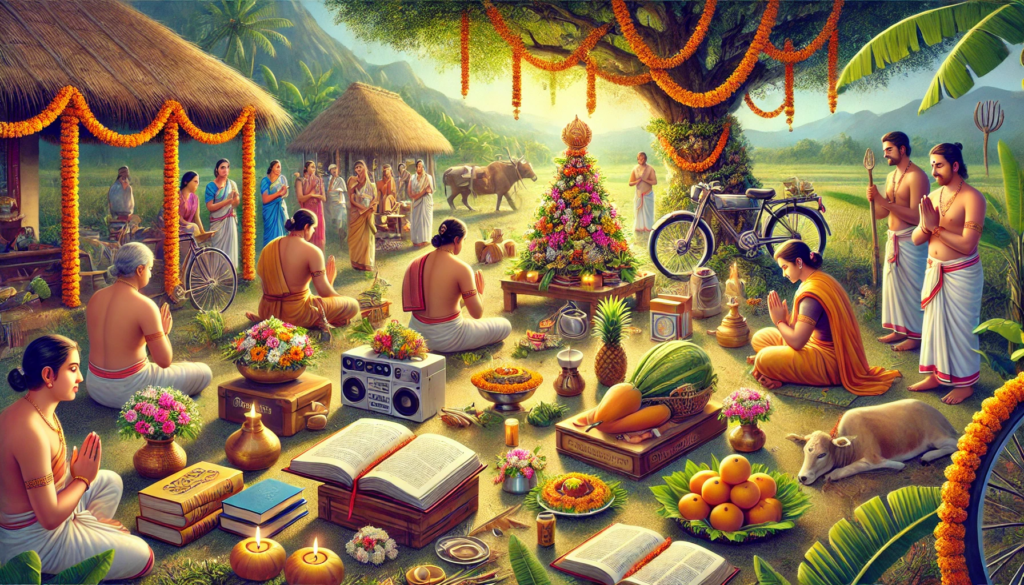
Ayudha Puja might just be one of the most relatable rituals out there. Why? Because it connects directly with what we do every day. Whether it’s cooking, fixing cars, writing articles, or managing data our tools play a huge role in how we achieve our goals. And taking a day to appreciate them feels oddly fulfilling, doesn’t it?
This Puja reflects respect for one’s profession, a value deeply embedded in Indian culture. For instance, artists worship their paintbrushes, teachers their books, and chefs their kitchen knives. If you look closely, it’s a humble recognition that without these “inanimate partners,” our achievements would be impossible.
Let’s make it relatable. Imagine if your laptop, after all its years of loyal service, suddenly decided to strike unless it got its yearly floral garland and aarti! It’s kind of like that; only this time do we get to choose to be appreciative before it comes to that.
Conclusion
Ayudha Puja is a beautiful reminder to honor the tools that support our daily lives, reflecting gratitude, skill, and unity. It teaches us to appreciate the objects we use and the talents we wield with them. Every tool deserves respect, whether it’s a book, a plow, or a laptop. So, this Dasara, take a moment to celebrate the partnership between you and your tools—they are the unsung heroes of our success.
Visit Free Saving Tips.
FAQ
Ayudha Puja is a ritual during Dasara where tools, instruments, and implements are worshipped to show gratitude for their role in our daily lives.
It’s celebrated to honor tools that support our work, symbolizing gratitude, skill, and empowerment.
Everyone—from students and artisans to homemakers and professionals—worships their respective tools, like books, machinery, or even vehicles.
It is linked to Arjuna retrieving his weapons and Goddess Durga’s empowerment, representing the triumph over evil.
It is celebrated on the ninth day of the Navaratri festival, typically in September or October.
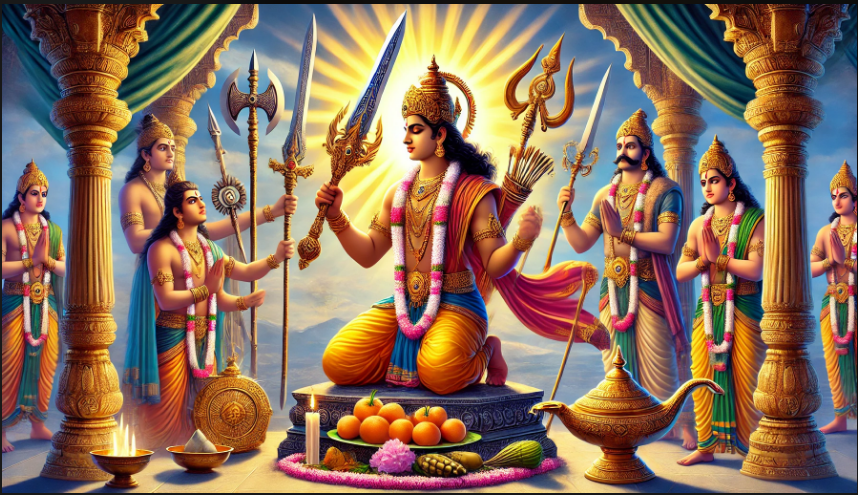








I don’t think the title of your article matches the content lol. Just kidding, mainly because I had some doubts after reading the article.
Thanks for your feedback and sense of humor! Feel free to share your doubts—I’ll be happy to help clarify.
Can you be more specific about the content of your article? After reading it, I still have some doubts. Hope you can help me.
Thank you for reading my article! I appreciate your interest. I’d be happy to clarify any doubts please let me know what specific questions you have, and I’ll do my best to help!
Your article helped me a lot, is there any more related content? Thanks!
I don’t think the title of your article matches the content lol. Just kidding, mainly because I had some doubts after reading the article.
Your article helped me a lot, is there any more related content? Thanks!
Thank you for your sharing. I am worried that I lack creative ideas. It is your article that makes me full of hope. Thank you. But, I have a question, can you help me?
Thanks for sharing. I read many of your blog posts, cool, your blog is very good.
I am extremely inspired along with your writing talents as smartly as with the structure in your blog. Is this a paid topic or did you modify it your self? Either way keep up the nice quality writing, it’s rare to peer a nice blog like this one nowadays!
I’m extremely impressed along with your writing skills as
smartly as with the structure in your blog. Is that this a paid subject matter or did you modify it your self?
Anyway keep up the excellent quality writing, it is uncommon to see a great weblog like this one today.
Instagram Auto comment!
Thank you so much for your kind words! The blog is fully customized, and your support truly inspires me to continue creating high-quality content.
I am really impressed along with your writing abilities as smartly as with the
structure for your weblog. Is that this a
paid theme or did you modify it your self?
Either way stay up the nice quality writing, it’s uncommon to look a nice blog like this one
today. Fiverr Affiliate!
I don’t think the title of your article matches the content lol. Just kidding, mainly because I had some doubts after reading the article.
Your point of view caught my eye and was very interesting. Thanks. I have a question for you.
Can you be more specific about the content of your article? After reading it, I still have some doubts. Hope you can help me.
Your point of view caught my eye and was very interesting. Thanks. I have a question for you.
Your point of view caught my eye and was very interesting. Thanks. I have a question for you.
Thanks for sharing. I read many of your blog posts, cool, your blog is very good.
Can you be more specific about the content of your article? After reading it, I still have some doubts. Hope you can help me.
Thank you for your sharing. I am worried that I lack creative ideas. It is your article that makes me full of hope. Thank you. But, I have a question, can you help me?